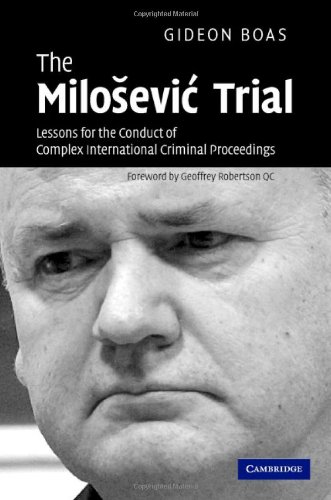Gideon Boas0521876990, 9780521876995, 9780511342417
Table of contents :
Cover……Page 1
Half-title……Page 3
Title……Page 5
Copyright……Page 6
Dedication……Page 7
Contents……Page 9
Foreword……Page 14
Preface……Page 19
Introduction……Page 21
The Purpose and Content of this Book……Page 22
The Structure of this Book……Page 25
The Context of this Book……Page 29
Introduction……Page 33
Fair Trial Rights……Page 35
Requirement that the proceedings be public……Page 41
Adequate time and facilities to prepare a defence……Page 47
Trial without undue delay……Page 49
Equality of arms……Page 52
The right to confront witnesses……Page 63
Written evidence in lieu of oral testimony……Page 67
Admission of adjudicated facts……Page 70
The right to counsel and to self-representation……Page 73
Defence counsel representation in international criminal courts and tribunals……Page 75
Self-representation……Page 77
Standby counsel……Page 81
Expeditious Trials……Page 83
2 The Miloševic Prosecution Case: Getting Off on the Wrong Foot……Page 99
Content and Scope of the Miloševic Indictments……Page 100
The prosecution case concerning Kosovo……Page 101
B The Croatia and Bosnia indictments……Page 103
The prosecution case concerning Croatia and Bosnia……Page 104
The prosecution case on ‘Greater Serbia’……Page 110
The form of the indictment……Page 113
Review of indictments……Page 115
The Kosovo indictment……Page 116
Defects in the form of the Croatia and Bosnia indictments……Page 127
Conclusion on the defects in the three indictments……Page 128
Joinder application before the Trial Chamber……Page 135
Joinder application on appeal……Page 138
Rule 98bis (Judgement of Acquittal) Decision……Page 141
Did Miloševic intend to commit genocide?……Page 143
Dismissal of numerous allegations in Croatia and Bosnia indictments……Page 146
Conclusion……Page 147
Conclusion……Page 148
3 Case Management Challenges in the Miloševic Trial……Page 151
The scope of the prosecution case……Page 153
Trial Chamber’s management of the prosecution case……Page 162
Conduct of the defence case……Page 173
Trial Chamber’s management of the defence case……Page 175
Severance of one or more indictments……Page 183
Case management principles in national and international criminal law……Page 190
Case management in common law systems……Page 191
Caseflow management or differential case management……Page 192
Individual case management……Page 194
The willingness and capacity of judges to manage cases……Page 196
Case management in civil law systems……Page 198
Germany……Page 199
Belgium……Page 200
Case management in international criminal law……Page 201
The framework for best case management practice in international criminal law……Page 202
Case management in the ICTY……Page 208
Case management regulations at the ICTY……Page 209
Learning from the Miloševic case……Page 213
Conclusion……Page 219
4 Representation and Resource Issues in International Criminal Law……Page 225
Self-representation in international criminal law – limitations and qualifications on that right……Page 226
Early history……Page 228
Miloševic – First Reasoned Decision of 4 April 2003……Page 229
Removing the right to self-representation……Page 231
Appeals Chamber decision of 1 November 2004……Page 238
The Special Court for Sierra Leone……Page 242
The ICTR……Page 246
The ICTY……Page 248
The Supreme Iraqi Criminal Tribunal……Page 258
Practical difficulties of imposing counsel on uncooperative accused……Page 259
Resources and Facilities Available to Milosevic……Page 265
The use of amici curiae in international criminal law……Page 266
Role of amici curiae in the Miloševic case……Page 271
Actual assistance provided to the accused by the amici curiae……Page 274
The future for the innovative use of amicus curiae in complex international criminal trials……Page 276
The provision of ‘legal associates’ in the Miloševic trial……Page 278
Resource issues in international criminal trials – Milošvic and other senior level accused……Page 280
Concluding comments on resource issues and the equality of arms……Page 283
Conclusion……Page 285
5 Conclusions……Page 291
The prosecution case must be focused, comprehensible and manageable……Page 295
The future of case management in complex international criminal law cases……Page 299
Managing resource and representation issues in complex international criminal law cases……Page 304
The outdated common law/civil law divide: time for international criminal law to evolve……Page 306
The need to consider a new appellate jurisdiction for international criminal law……Page 308
After Miloševic: the future of complex international criminal trials……Page 311
Index……Page 314

Reviews
There are no reviews yet.